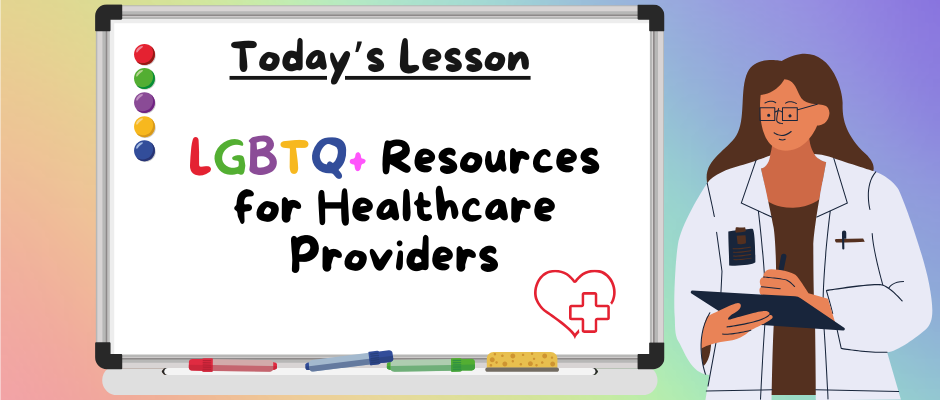Jun
20

Posted by Nora Barnett on June 20th, 2024
Posted in: Blog
Tags: LGBTQ+, lgbtq+ health

This week’s post is for healthcare and public health professionals. We’ve curated a collection of resources to help you create affirming healthcare environments and deliver culturally and clinically competent care for LGBTQIA+ individuals.
Searching PubMed for LGBTQIA+ health research
This guide from our colleagues at USC has suggestions for MeSH terms you can use to find articles about LGBTQIA+ populations and health.
Healthcare Equality Index 2024
The Healthcare Equality Index (HEI) 2024, created by the Human Rights Campaign Foundation, is a tool that evaluates healthcare facilities on their LGBTQ+ inclusion and equity practices. It examines policies and practices related to non-discrimination, patient services, employee benefits, and community engagement. Nearly 2,400 facilities were assessed, with over 1,000 actively participating. Of these, 384 facilities earned the top “LGBTQ+ Healthcare Equality Leader” status, while 462 were recognized as “LGBTQ+ Healthcare Equality High Performers”.
Providing Inclusive Services and Care for LGBT People: A Guide for Health Care Staff
This guide from the National LGBTQIA+ Health Education Center highlights the need for inclusive health care for LGBT individuals, who often encounter barriers like poor access, discrimination, and uninformed providers. It includes background information on LGBT people and their health needs; tips and strategies for improving communication and creating a welcoming environment,; and additional information about how to care for LGBT people.
Focus on Forms and Policy: Creating an Inclusive Environment for LGBT Patients
This guide from the National LGBTQIA+ Health Education Center offers guidance on creating policies, procedures, and forms that create an inclusive environment for LGBT patients. Includes information on nondiscrimination and employment policy language, collecting data, taking routine sexual histories, language used in registration and medical history forms, training front-line staff, organizational language, and recommended language for family members.
Collecting Sexual Orientation and Gender Identity Data in Electronic Health Records
This guide from the National LGBTQIA+ Health Education Center includes recommended questions, workflows for collecting data, and information on training staff.
Providing Affirmative Care for Patients with Non-binary Gender Identities
This guide from the National LGBTQIA+ Health Education Center helps healthcare providers in offering an inclusive, affirming experience for people with non-binary gender identities. Includes information on understanding non-binary gender identities, using names and pronouns, barriers to care, case scenarios, and best practices for creating affirming and welcoming environments for non-binary people.
Affirmative Services for Transgender and Gender Diverse People – Best Practices for Frontline Health Care Staff
This guide from the National LGBTQIA+ Health Education Center offers best practices and guidance for frontline healthcare staff on effectively serving transgender and gender-diverse patients. It covers topics such as using gender-affirming language, collecting data on sexual orientation and gender identity, and asking for patients’ names and pronouns. Additionally, it includes a quick-reference sheet that can be detached and posted in a workspace for easy access.
Providing LGBTQ-Inclusive Care at Your Pharmacy
This guide from the Human Rights Campaign Foundation helps pharmacists and pharmacy staff provide inclusive and welcoming care for LGBTQ patients. It covers key concepts, healthcare disparities, and practical steps for creating a supportive environment. Topics include staff training, appropriate communication, and community engagement.
Asking Essential Sexual Health Questions
This document from the National Coalition for Sexual Health guides healthcare providers in incorporating sexual health questions into routine medical histories. Designed to be inclusive of various gender identities and sexual orientations, itprovides guidance on asking questions about gender identity and sexual orientation in a respectful and non-judgmental manner. It includes recommendations for discussing sexual health with adolescents and addressing the specific needs of LGBTQ+ individuals.
LGBT Best and Promising Practices Throughout the Cancer Continuum
This guide from the National LGBT Cancer Network offers best practices for health care providers and public health departments regarding cancer prevention, primary care, diagnosis, treatment, survivorship, and palliative care for the LGBTQIA+ population.
Meeting the Needs of Lesbian, Gay, Bisexual, Transgender, Queer, and Intersex (LGBTQI+) Individuals During Disasters and Emergencies
FEMA’s 2020 annual National Preparedness Report identified communities of color, single parents, lesbian, gay, bisexual, and transgender people as being at the highest risk for being severely impacted during disasters. The Administration for Strategic Preparedness and Response page on LGBTQI+ individuals during disasters recommends inclusive practices for emergency planners and shelter providers, such as training staff, ensuring access to gender-appropriate facilities, and safeguarding confidentiality.
NIH Sexual & Gender Minority Research Office (SGMRO)
NIH’s Sexual & Gender Minority Research Office (SGMRO) coordinates sexual and gender minority (SGM)–related research and activities within the NIH. Their page includes a list of events, such as webinars and symposiums; reports; and resources, including a resource on gender pronouns in the workplace and a training on culturally-competent gender related language.
The HHS LGBTQI+ Health & Well-being Hub